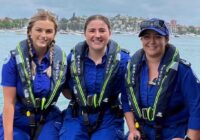- Maritime Safety Queensland (MSQ) is launching a crackdown on boaties failing to wear lifejackets across the state these Easter holidays.
- MSQ and the Queensland Police Service (QPS) will be out in force along almost the whole coastline between 1 April and 16 April.
- The campaign will focus on boating’s ‘Fatal Five’ and is aimed at reducing deaths and serious injuries from boating.
- A trial run on the Gold Coast’s Coomera and Nerang Rivers this weekend saw authorities stopping boats on the water to check safety gear.
- The Saturday 25 March joint MSQ/QPS operation on Coomera River saw:
- 145 boaties intercepted (99 vessels, 2 sailing vessels and 44 PWCs/jetskis)
- 12 caught speeding (8%)
- 10 not carrying correct lifejacket (7%)
- 7 not registered (5%)
- 3 not keeping a safe distance (2%)
- 1 drink driving (0.7%)
More than one million Queenslanders hold recreational boating licences and there are more people than ever before out enjoying the state’s remarkable marine environment and great lifestyle.
However, every year, more than 300 recreational boating incidents are reported to MSQ with annual fatality numbers tragically reaching double figures in recent years (15 for the 2022 calendar year).
Easter is both the most popular and highest-risk time for recreational boating.
Lifejackets are vital when operating vessels. There were 21 ‘person overboard’ incidents in 2021 resulting in eight drownings. None of the eight were wearing lifejackets.
Between 2012 and 2021 in Queensland, 78 people drowned or were presumed to have drowned in incidents involving at least one recreational vessel. 69 of these people were believed not to have been wearing lifejackets.
Excessive speed was another frequent cause of life-endangering marine incidents – a factor in one in five serious injuries in Queensland waters.
Other ‘Fatal Five’ behaviours in addition to speeding and failure to wear lifejackets were failure to keep a proper look out, alcohol and drug use and poor trip planning.
Boaties on the Gold Coast’s Coomera and Nerang Rivers experienced a crackdown trial run this weekend with authorities stopping most skippers on the rivers and checking their safety gear. (Statistics available)

MSQ General Manager Kell Dillon said “There is no more critical time to wear your lifejacket than Easter, which is the busiest time on Queensland’s waterways.
“I urge boaties to wear their lifejackets these Easter holidays when crowds of boaties, paddle craft and swimmers with varying skill levels are all interacting with one another.
“No one plans for an accident, but you can plan to wear your lifejacket, so an unexpected event doesn’t cost someone their life.
“Skippers should make sure everyone on their boat is wearing a properly fitting and properly working lifejacket.
“Safety equipment is there to avoid fatalities as skippers can face unexpected, life-threatening incidents such collisions and capsizes on congested waterways.
“Wearing a lifejacket is strongly recommended at all times, but especially during heightened times of risk, such as at night, in rough weather, when offshore or boating alone.
“We want everyone to plan their trip wisely, so they come home safely this Easter.
“Proper trip planning requires making sure you know your route, have enough fuel onboard, have checked the weather, and also that you have all of the required safety equipment, properly maintained, and you know what the speed limits are in the areas you will be operating in.”
Sergeant Justin Dunn, Queensland Water Police said “Police will be out and about right alongside our counterparts at MSQ to ensure the safety of everyone in the water over the holiday period.
“We want boaties to make sure they have planned for the worst before heading out.
“Boaties should expect to be stopped by police for compliance checks of their licence, registration and onboard safety equipment.
“Watercraft operators are also subject to random breath and- drug testing by police – just the same as if you are driving a car so expect to be tested.
“Vessel operators are also reminded of the critical importance of checking the weather forecast before they head out and to make sure they are logging on with our volunteer partners.
“It is of utmost importance that someone knows where you are going, what you are doing and when you will be returning.
“Even if you’re experienced on the water, these simple rules save lives, so make sure to follow them, and always advise someone where you are going and when you plan to return.”







